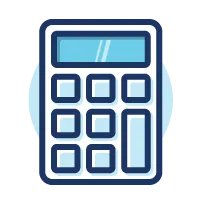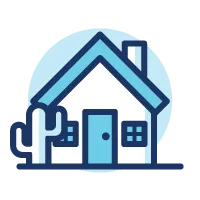As real estate markets re-open across the country, current historically-low mortgage rates may make it seem like the perfect time to purchase your first home. For many, owning a home is a big part of the American Dream. There’s a sense of pride and accomplishment in ownership. It can give you greater freedom and privacy, while also adding to your financial security. However, purchasing a home is also a substantial responsibility and commitment—not to mention one of the largest (if not the largest) purchases you’ll make in your life. One of the biggest mistakes first-time homeowners make is spending more than they can afford by overlooking the “true” cost of homeownership. When budgeting for your first home, here are seven often overlooked costs that can have a big impact on your bottom line:
1. Property Taxes
When shopping for a new home, pay attention to the property taxes! Property taxes not only vary wildly state-to-state, but also within the same city. It’s also important to note that property taxes can go up substantially when a home gets re-appraised and it is found that the home’s value has gone up. So, if you’re buying a home that hasn’t been re-appraised in quite some time and the current owner made some substantial upgrades, it’s important to note that the historical numbers you are seeing will likely go up after you purchase the home.
2. Closing Costs
Buyers are often so focused on the purchase price of their home and the initial down-payment, it can be all too easy for closing costs to get overlooked. Due at the time the buyer closes on the home, these fees include things like mortgage taxes, lender application fees, attorney’s fees, title insurance, and appraisal fees, that typically range from 2-5% of your home’s purchase price. So, for a $250,000 home, you should expect to pay anywhere between $5,000 to $12,500 in addition to your mortgage payment. Make sure you factor these costs into your budget when deciding what you can afford.
3. Private Mortgage Insurance (PMI)
If your down payment is less than 20% of the home’s price, you usually are required by the lender to take out a private mortgage insurance policy until you have accrued 20% equity in your home. This policy protects the lender in case you default on the loan. PMI typically amounts to .5% - 1% of the entire loan amount on an annual basis—which could add up to several thousand extra dollars a year.
4. Homeowner’s Insurance
Many first-time buyers often underestimate the cost of homeowner’s insurance. According to insurance. com, the national average annual homeowner’s insurance payment is currently $1,244. However, if you live in a state such as Florida where storms drive up premiums, you could pay as much as $3,951 for the same amount of coverage.
5. Utility Costs
If you’re used to apartment living, it’s important to note that the utility costs for a home with a single family footing the bill will be significantly higher. You’ll want to consider electric, gas, water, sewer, cable, telephone and internet. When shopping for a new home, it can be a good idea to ask the current homeowner what their monthly utilities typically run so that you can get a realistic expectation of what you should expect to pay.
6. Moving Costs
Although it’s a one-time cost, a same city move averages $1,000, and can go up from there depending on the size of your house and distance, so make sure you factor it in.
7. Home Maintenance and Repairs
Even if you buy a home that’s move-in ready, it’s important to have a “rainy day” fund ready for when the AC goes bad or you finally need a new roof. Depending on your house’s age, homeowners should plan to save 1 to 4% of your home’s value each year to be able to cover repair and maintenance expenses that will come up. Home buying might seem like a complicated process, but with the right planning, budgeting and preparation, it can be incredibly rewarding.
Call GreenPath to speak with a housing expert.
GreenPath’s certified housing counselors can prepare you with the knowledge and tools you’ll need to make the best decisions. The counselors at GreenPath can provide you with valuable information and resources to help make your purchase a valuable part of your long-term financial health and wellness, including:
- Helping you to understand what you can afford and creating a spending plan
- Creating a plan to improve your credit score
- Presenting options for down payment assistance and affordable loan programs
Call GreenPath today or request a call with one of their counselors online.
This blog post was brought to you by GreenPath Financial Wellness.
Chris “Peach” Petrie is the founder of Money Peach. Money Peach partnered with OneAZ to provide free financial education to members across the state. To learn more about OneAZ’s partnership with Money Peach, click here.
APR = Annual Percentage Rate












